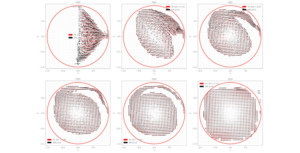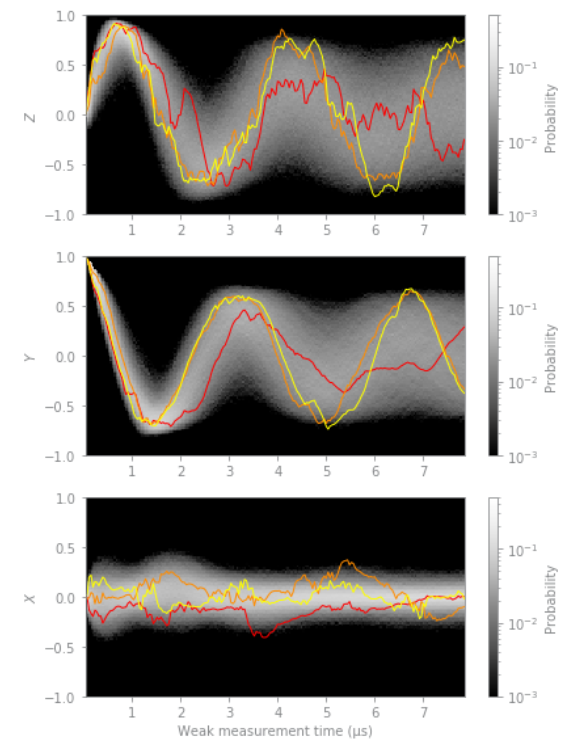 All quantum systems couple to their surrounding environment, itself composed of unmonitored quantum-coherent degrees of freedom. Often the environment exhibits a memory of the system’s state, resulting in Non-Markovian return of quantum information to the system at later times. Since current techniques to reconstruct a system’s state from experimental data, such as stochastic master equations (SME’s), rely on Markovianity, understanding how quantum-coherent devices evolve in the presence of non-Markovian effects remains an outstanding problem. We use continuous quantum state tracking with weak measurement to experimentally investigate non-Markovianity in transmon superconducting qubits and train recurrent neural network models to reconstruct quantum trajectories, motivated by such models’ demonstrated ability to learn long-time correlations in sequential data. Accurately reconstructed quantum trajectories in turn enable us to determine the degree to which a system is non-Markovian, estimate time-dependent SME parameters, and map heterodyne backaction.
All quantum systems couple to their surrounding environment, itself composed of unmonitored quantum-coherent degrees of freedom. Often the environment exhibits a memory of the system’s state, resulting in Non-Markovian return of quantum information to the system at later times. Since current techniques to reconstruct a system’s state from experimental data, such as stochastic master equations (SME’s), rely on Markovianity, understanding how quantum-coherent devices evolve in the presence of non-Markovian effects remains an outstanding problem. We use continuous quantum state tracking with weak measurement to experimentally investigate non-Markovianity in transmon superconducting qubits and train recurrent neural network models to reconstruct quantum trajectories, motivated by such models’ demonstrated ability to learn long-time correlations in sequential data. Accurately reconstructed quantum trajectories in turn enable us to determine the degree to which a system is non-Markovian, estimate time-dependent SME parameters, and map heterodyne backaction.

• Driven qubit-cavity system:
Precise quantum control of superconducting qubits necessitates determining the time-dependent Hamiltonian of control pulses with high fidelity. While continuous state tracking has proved effective for determining single-qubit time-evolution in regimes with Markovian dynamics, fast control pulses used for native quantum gates and entanglement generation can result in non-Markovian transient dynamics. We use quantum state tracking with continuous weak measurement to experimentally investigate non-Markovianity in a transmon superconducting qubit coupled to a readout resonator. By weakly measuring the qubit state during a Rabi oscillation sequence on a timescale comparable to the cavity decay rate, we isolate dynamics that are difficult to describe with single-qubit trajectory theory. We are currently studying the effect of qubit-cavity hybridization and heterodyne backaction.
• Multi-qubit system:
We investigate an analog quantum simulation of a qubit strongly coupled to an unmonitored, coherent environment with two qubits on a multi-qubit chip coupled by an always-on cross-resonance (CR) and ZZ interaction, where one qubit acts as the system and the other as the environment. As the two-qubit state oscillates between a separable and entangled state due to the CR interaction, the system qubit oscillates between a pure and mixed state, simulating decoherence to the environment and non-Markovian information backflow.
Current Status & Next Steps
Current research activities revolve around analysis of single-qubit evolution in the presence of non-Markovian quantum memory with the goal of estimating time-dependent SME parameters and characterizing memory properties such as correlation time. Future directions include investigating other systems that host non-Markovian effects, characterizing the properties of non-Markovian memory, investigating methods of general non-Markovian trajectory reconstruction beyond recurrent neural networks, diagnosing gate errors with continuous weak measurement, and measuring quantum trajectories of three level systems.